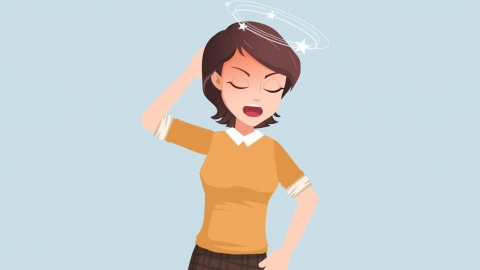What causes dizziness when standing up from a squatting position?
Generally, dizziness upon standing up from a squatting position may be caused by rapid movements, insufficient water intake, benign paroxysmal positional vertigo, anemia, cervical spondylosis, and other factors. Symptomatic management such as general treatment or medication may be needed. If discomfort occurs, it is recommended to seek medical attention promptly and undergo appropriate treatment under a doctor's guidance. Detailed analysis is as follows:

1. Rapid Movements
If the movements of squatting down or standing up are too fast, it may cause temporary insufficient blood and oxygen supply, leading to dizziness. This occurs because when body position changes rapidly, blood might not quickly return to the heart and brain, causing transient hypotension and cerebral hypoperfusion, accompanied by symptoms such as visual darkening and vertigo. It is recommended to rest appropriately, slow down the pace of physical activity, and avoid rapid changes in body position.
2. Insufficient Water Intake
Inadequate water intake may lead to reduced blood volume and decreased blood pressure, thereby affecting circulation and causing dizziness upon standing up from a squatting position. Symptoms may include thirst, dry skin, and reduced urine output. It is recommended to maintain adequate hydration by drinking sufficient water and other fluids daily to ensure proper hydration.
3. Benign Paroxysmal Positional Vertigo (BPPV)
The vestibular system in the inner ear is responsible for sensing head position and movement. When otoliths (ear stones) become dislodged, changes in head position can stimulate overly sensitive vestibular organs, causing vertigo and dizziness. It is recommended to use medications such as promethazine hydrochloride tablets, betahistine hydrochloride tablets, and ginkgo biloba leaf tablets under a doctor's guidance for treatment.
4. Anemia
Anemia refers to a condition in which the number of red blood cells or the level of hemoglobin in the blood is too low, potentially reducing the blood's ability to carry oxygen. Especially when standing up quickly after squatting, the brain's demand for oxygen suddenly increases, but in an anemic state, the blood cannot meet this demand promptly, leading to cerebral hypoxia and dizziness. Symptoms may include pallor, fatigue, palpitations, etc. It is recommended to follow medical advice and use medications such as ferrous sulfate tablets, iron fumarate granules, and polysaccharide-iron complex capsules for treatment.
5. Cervical Spondylosis
Chronic strain and degenerative changes in the cervical spine can cause cervical spondylosis. When cervical vertebrae protrude and compress nerves and blood vessels, dizziness may occur during the process of squatting and standing up. Symptoms may also include limb numbness, nausea and vomiting, neck pain, etc. It is recommended to follow medical advice and use medications such as chlorzoxazone tablets, eperisone hydrochloride tablets, and naproxen sodium tablets to alleviate symptoms.
It is recommended to engage in regular exercise, such as simple aerobic activities like walking or jogging, to enhance cardiovascular function and help reduce the risk of dizziness.






